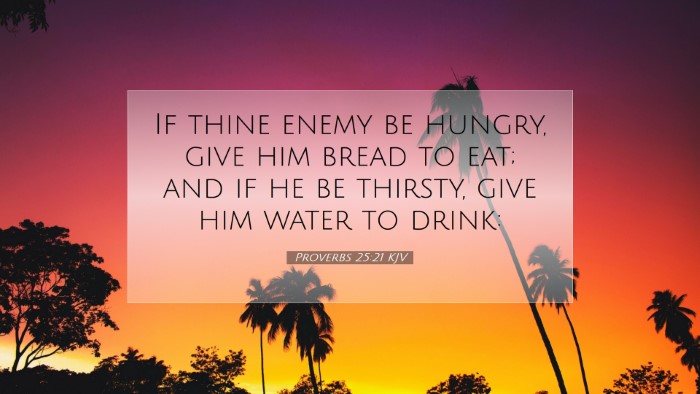Commentary on Proverbs 25:21
Bible Verse: "If your enemy is hungry, give him bread to eat; and if he is thirsty, give him water to drink." (Proverbs 25:21, NKJV)
Introduction
The verse from Proverbs 25:21 offers profound insight into the wisdom of responding to enmity with kindness. It is a commentary on the moral and ethical responsibilities that individuals have toward others, particularly those with whom they are in conflict. This commentary draws from the insights of esteemed theologians such as Matthew Henry, Albert Barnes, and Adam Clarke to provide a comprehensive understanding of this scriptural directive.
Textual Analysis
Contextual Background: This proverb is nestled within a collection of wisdom sayings attributed to Solomon, reflecting on the principles of righteous living and social conduct. The preceding verses highlight various aspects of wisdom in dealing with others, making this verse a pivotal teaching on love and forgiveness.
Literary Style: The verse employs a condition-action format, where the condition is the presence of an enemy and the action encouraged is to provide basic sustenance—bread and water. This stark contrast highlights the radical nature of the response required from the believer.
Theological Insights
Matthew Henry's Perspective: Matthew Henry emphasizes the nature of true love and charity as transcending mere feelings or attitudes. He notes that genuine love is displayed through action, especially towards those who may be perceived as adversaries. By encouraging provision to one's enemy, Henry illustrates the transformative power of love, suggesting that such acts can lead to coals of fire being heaped upon their head, rendering the adversary ashamed and potentially leading to reconciliation.
Albert Barnes' Commentary: Albert Barnes focuses on the practical implications of this instruction, advocating for active compassion over passive neutrality. He points out that providing for an enemy's needs not only serves to extinguish hostility but is also an act of obedience to divine law. Barnes links this principle to the broader biblical call to love one's enemies, as echoed in the New Testament teachings of Christ (Matthew 5:44).
Adam Clarke's Exegesis: Adam Clarke delves deeper into the moral significance of the actions described in this proverb. He interprets "bread" and "water" as metaphors for the basic necessities of life, thereby extending the concept of generosity beyond physical food. Clarke suggests that these acts reflect a heart aligned with God's character, one that desires to mirror His grace in an often unjust world.
Practical Applications
- Radical Kindness: Embracing the challenge laid before us in Proverbs 25:21 requires believers to cultivate a spirit of radical kindness. This is not merely an act of moral superiority but a reflection of Christ’s love and grace.
- Conflict Resolution: The verse underscores the importance of pursuing peace, offering practical steps toward resolution by addressing needs rather than dwelling on grievances. This approach can transform relationships and foster community healing.
- Witness to the World: In a world rife with division, the believer’s response to hostility through kindness can serve as a powerful witness to the grace and mercy of God. Such acts mimic the heart of the Gospel and invite others to reconsider their perceptions of the faithful.
Conclusion
Proverbs 25:21 serves as a compelling reminder of the high calling placed upon believers. By drawing from the insights of renowned commentators like Matthew Henry, Albert Barnes, and Adam Clarke, we see that this verse embodies a divine strategy for dealing with adversaries—rooted in love, compassion, and humility. In living out such directives, individuals not only fulfill a moral obligation but engage in the transformative work of God's kingdom, fostering reconciliation and demonstrating the power of Christ’s love to a watching world.


